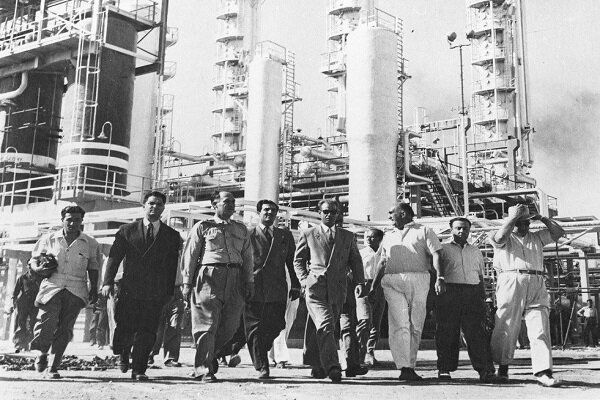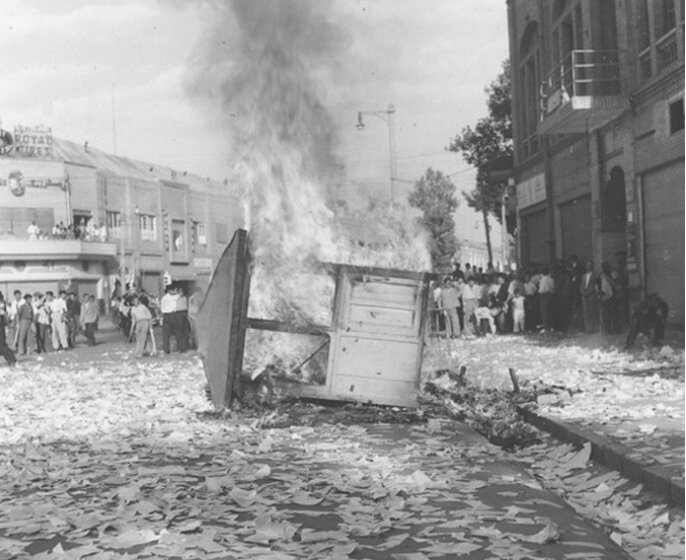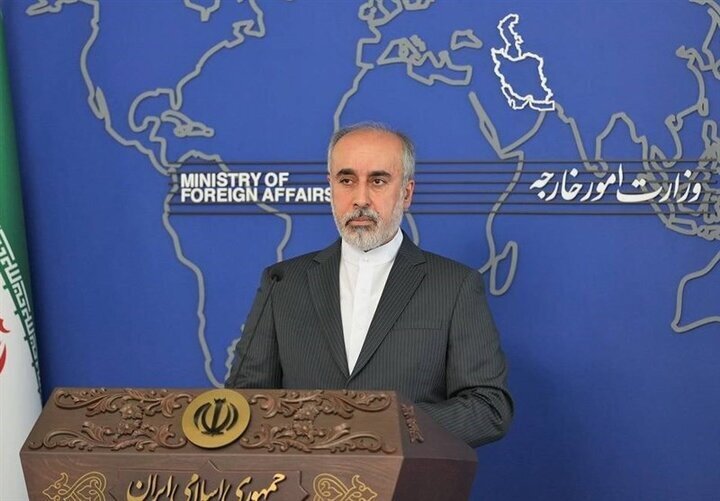1953 coup exposed true face of US to Iranian people
American history prof. told MNA

TEHRAN, Aug. 18 (MNA) –Prof. Yaghoubian says, " The US orchestrated 1953 coup itself and subsequent American-enabled abuses of the Pahlavi dictatorship (such as the horrors of SAVAK) exposed the true face of Washington to the Iranian people."
1953 coup in Iran, coup d’état in Iran that occurred in August 1953. Funded by the United States and the United Kingdom, it removed Mohammad Mosaddegh from power and restored Mohammad Reza Shah Pahlavi as Iran’s King. Some 300 people died during fighting in Tehran.
With its strategic location and vast oil reserves, Iran was of special interest to the United States, the United Kingdom, and other powers. Britain had established a presence in the country during World War II to protect a vital supply route to its ally the Soviet Union and to prevent the oil from falling into German hands. After the war, the United Kingdom effectively retained control over Iran’s oil through the establishment of the Anglo-Iranian Oil Company.
This arrangement changed abruptly in 1951 when the Iranian parliament, led by Mosaddegh’s nationalist and democratically elected government, voted to nationalize the country’s oil industry. Seeing its interests thus threatened, the UK embarked on a secret campaign to weaken and destabilize Mosaddegh. At first the British government tried to convince the shah to remove Mossadegh from office by engineering a parliamentary decree, a ploy that both failed and enhanced Mosaddegh’s reputation while diminishing the shah’s. When the push to remove Mosaddegh evolved into the idea of a coup to overthrow the government, Britain, reluctant to shoulder the responsibility alone, persuaded the U.S. to join forces by playing on Cold War fears.
To know more about the US and the UK goals behind the coup, we reached out to Dr. David Yaghoubian, a Professor of History at California State University, San Bernardino.
Here is the full text of the interview:

What were the goals behind the US and UK orchestrated coup?
The 1953 coup in Iran was orchestrated to fulfill the goal of the UK and the US to simultaneously crush the oil nationalization movement and replace Iran’s democratically elected government with the dictatorship of the puppet Pahlavi regime. It enabled a consortium of western companies to subsequently control Iranian oil, and Mohamad Reza Pahlavi to remain on the throne to serve foreign interests, against the will of the Iranian people and to their collective detriment. Although the 1953 coup was not intended to sow the seeds of revolution in Iran, ultimately this was its primary accomplishment.
Why was the nationalization of the Iranian oil industry so important for them that they couldn't tolerate Iran's democratic then government?
As the largest source of crude under the control of the UK, the nationalization of the AIOC in 1951 was intolerable for a dying British empire, which initially resorted to enforcing a global boycott of Iranian oil, before successfully manipulating Cold War fears of the new American presidential administration in 1953 to motivate collective action to carry out the coup. Paralleling Eisenhower administration concerns about potential Soviet interests was a clear desire to exert American control over Iranian oil (and thus over British energy resources) evidenced by the equal US/UK division of spoils via the 1954 consortium. Dividing Iran’s oil wealth among this consortium of foreign companies would never be an acceptable proposition to democratically elected Iranian leadership, thus the coup was designed to implant a compliant and subservient comprador government in Iran to serve overlapping British and American interests.
How has the US-orchestrated coup affected the relations between the two countries since then up to now?
The 1953 US-orchestrated coup was the crucible of modern Iran-US relations. The coup itself and subsequent American-enabled abuses of the Pahlavi dictatorship (such as the horrors of SAVAK) exposed the true face of the United States government to the Iranian people, who rose up collectively to expel the American Shah, and the tens of thousands of US military advisors and contractors that his regime employed. The success and durability of the Iranian revolution since 1979 simply drives American imperialists mad. Nearly a half century of failed attempts at coercion, bullying, provocation, vilification, global ostracization, and even starvation (according to former US Secretary of State Mike Pompeo) since the revolution have only served to isolate the United States and further point out its rapid decline. Having failed to keep the Iranian nation down via their puppet dictator (1953-1979), failed to destroy Iran via support of the Iraqi Baathists (1980-1988), and subsequently failed to contain, retard, control, or otherwise influence the trajectory of the Islamic Republic and its alliances, US empire has been effectively checked in the region.
Do you see any changes in the colonial policies of the US? Have they stopped it or just changed the methods?
Rather than changes in colonial policies or employment of different methods I see abject failure, continuity, and self-defeating stupidity on a vast scale, in conjunction with the inexplicable attempt to double down on unsuccessful policies of the past. Until American imperialists can come to grips with the fact that the United States will never achieve global hegemony and “full spectrum dominance,” and that their efforts to promote such US unipolar primacy are demonstrably absurd and counterproductive, the United States will continue to pursue policies and short-term objectives that will ultimately benefit only the military-industrial complex, while hastening the demise of American power, legitimacy, and relevance. Consider American policies that sustained the criminal occupation of Iraq, Syria, and Afghanistan, the carnage in Yemen and Libya, as well as the ongoing attempt to destroy Palestinian society in a wholly US-enabled genocidal project. Murder, destruction, and chaos continue to be the hallmarks of US foreign policy in West Asia. While the more sociopathic members of the American political establishment would claim that these results constitute success in the context of “containment,” area denial, and the twisted concept of “constructive instability,” the US position across the region, physically as well as diplomatically, becomes weaker and more perilous by the day. Its global reputation and legitimacy have never been lower in history. Yet on this 71st anniversary of the 1953 coup in Iran, in light of history and current events—including but not limited to the daily slaughter of Palestinian civilians—what does the United States continue to promote in the region besides more waste, tension, division, conflict, color revolution, war, and genocide? Nothing.
US, UK-backed 1953 coup shattered Iran's democratic process

TEHRAN, Aug. 18 (MNA) – August 19, is the anniversary of the coup d'état that was launched in 1953 by the US and the UK against Prime Minister Mohammad Mossadegh and the democratic process in Iran.
UK, US role in coup d'état; It’s Always About Oil
1953 coup in Iran that occurred in August 1953 funded by the United States and the United Kingdom, removed Mohammad Mosaddegh from power and restored Mohammad Reza Shah Pahlavi as Iran’s king. Some 300 people died during the fighting in Tehrān.
With its strategic location and vast oil reserves, Iran was of special interest to the United States, the United Kingdom, and other powers. Britain had established a presence in the country during World War II to protect a vital supply route to its ally the Soviet Union and to prevent the oil from falling into German hands. After the war, the United Kingdom effectively retained control over Iran’s oil through the establishment of the Anglo-Iranian Oil Company.

Prime Minister Mohammed Mosadegh; Iran's Oil Nationalization
Mohammad Mossadegh became Prime Minister of Iran in 1951 and was hugely popular for taking a stand against the Anglo-Iranian Oil Company, a British-owned oil company that had made huge profits while paying Iran only 16% of its profits and often far less. His nationalization efforts led the British government to begin planning to remove him from power.
In October 1952, Mosaddegh declared Britain an enemy and cut all diplomatic relations. Britain was unable to resolve the issue unilaterally and looked to the United States for help.

CIA Overthrew Iran's Democracy In 4 Days
The plot, known as Operation Ajax, centered on convincing Iran’s monarch to issue a decree to dismiss Mossadegh from office.
In early August, Iranian CIA operatives threatened Muslim leaders with “savage punishment if they didn't oppose Mossadegh,” thereby giving the impression that Mossadegh was cracking down on dissent.
On August 16, 1953, Mohammad Reza Pahlavi formally dismissed Mossadegh and nominated the CIA’s choice, General Fazlollah Zahedi, as Prime Minister. The decrees were dictated by Donald Wilber, the CIA architect of the plan.
Soon, massive protests, engineered by the US, took place across the city to assist the coup. Mosaddegh was imprisoned for three years and then put under house arrest until he died in 1967.
Anglo-US coup condemned Iran to decades of oppression
The coup not only encouraged the Shah’s descent towards dictatorship, but it would later become a rallying cry in anti-US protests during the 1979 Iranian Revolution. Even now, Mossadegh is one of the most popular figures in Iranian history.
Indeed, Mosaddeq would not have fallen from power without actions undertaken by Iranians. But it is misleading to elide the US role in the coup, the memory of which continues to continue to haunt US-Iran relations. Even more importantly, the United States played a major role in stabilizing the Shah’s post-coup regime. Focusing on the events of August 19 alone obscures Washington’s ultimate aim with the coup: the return of Iran’s oil resources to foreign control, an objective the United States achieved roughly one year after Mosaddeq’s dramatic fall from power.

Consequences of the 1953 Coup in Iran, West Asia
Iran, West Asia, and, arguably, the whole world may well have been profoundly different. Apart from rewriting the destiny of Iran and its neighbors, the coup paved the way for a series of imperialist interventions and the toppling of democratically elected governments across the global south.
The coup altered the geopolitical landscape in West Asia, became a blueprint for a succession of covert US efforts to foster coups and destabilize governments in the '50s, and provided the Soviet Union with ideological ammunition during the Cold War.
Following the 1953 coup in Iran, the CIA orchestrated the successful Guatemalan coup one year later, failed to oust Syria's president in 1957; and suffered a black eye backing the unsuccessful military invasion of Cuba in 1961.

CIA publicly acknowledges involvement in the 1953 coup
For decades, the United States denied playing any part in the Iranian coup. But that position ended in 2009 when President Barack Obama acknowledged Washington's role.
In Britain, meanwhile, the government-funded BBC provided details in 2011 of how it broadcast anti-Mossadegh programs to undermine his government.
Secret files and memoirs of CIA operatives show that the CIA played a pivotal role in initiating and planning Operation Ajax, as the covert operation to oust Mossadegh was called.
On Aug. 19, 2013, the CIA publicly admitted for the first time its involvement in the 1953 coup against Iran's elected Prime Minister Mohammad Mossadegh.
As we saw in the issue of the nationalization of Iran's oil industry and the withdrawal of this national strategic resource from British control, controlling the strategic natural resources of countries has always been one of the motivations of hegemonic powers such as the US to launch endless and multi-dimensional wars against oppressed nations.
Although superiority in the world economy is one of the powerful motivations of the US's involvement in any part of the world, interference in oil-rich countries, countries rich in mineral resources and natural wealth of the world such as Iran, Afghanistan, Iraq, Syria, Venezuela, and Ukraine have always required excuses such as fighting terrorism, defending freedom, guaranteeing security, pre-emptive defense strategy, etc., so that under their protection, the dominating countries, especially US, could implement their policies.
While the US considers itself the observer of other countries to follow all general and common laws, principles, and policies, does not obey these principles and laws
By reviewing the pages of this country's history in the world, there are many cases of violation of common laws and principles in the world by Washington against countries that oppose its policies and even in some cases friends of this country.
Reported by Sahar Dadjoo
Iran court holds 1st trial session over US-plotted 1953 coup

TEHRAN, Aug. 18 (MNA) – An Iranian court has begun the trial of the US administration and its officials over the 1953 coup against the democratically-elected government of Prime Minister Mohammad Mosaddegh.
The first session of the trial was held at the 55th branch of the court dealing with international affairs in Tehran’s Imam Khomeini Judicial Complex on Sunday, on the occasion of the 71st anniversary of the coup.
The court will hear a lawsuit filed by some 402,000 Iranians against six American natural persons and legal enteritis over their role in the ousting of Mosaddegh that consolidated the rule of the pro-Western monarch, Mohammad Reza Pahlavi, until the 1979 Islamic Revolution.
Lawyer Shami Aghdam, representing the defendants, said documents show the US spy agency CIA, with the help of its British counterpart MI6, planned the coup by using internal and external agents against the legitimate government of Iran on August 19, 1953.
Washington and London, it added, “designed the military coup through violating international principles and rules, and interfering in the internal affairs of Iran, intending to maintain their influence and power in the government, securing their interests and looting the country’s property.”
It added that the coup was perpetrated by military and political figures affiliated with the US and the UK governments, as well as thugs.
“In fact, the coup marked the beginning of the US’s complete domination over Iran to make it more dependent than before and prevent its independence and progress. The domination lasted for more than 25 years and inflicted costs, as well as material and spiritual damage, on the country and the nation.”
The 1953 coup set off a series of events, including riots on the streets of the Iranian capital Tehran, leading to the ousting and arrest of Mosaddegh, who was popular in Iran for nationalizing the country’s oil industry and taking it back from largely British control.
It also enabled the return from exile of Mohammad Reza Pahlavi who remained in power until the victory of the Islamic Revolution, led by Imam Khomeini.
Mosaddegh, who was convicted of treason by a court martial after the coup, served three years in solitary confinement and eventually died under house arrest in exile in 1967.
In 2013, the US formally admitted its role in the coup in 2013 with the declassification of intelligence documents.
SD/PressTV731586
US to forever be ashamed of overthrowing Mossadegh's govt.

TEHRAN, Aug. 18 (MNA) – Iranian Foreign Ministry Spokesperson stated that the disgrace of overthrowing the popularly elected government of Mohammad Mosaddegh through the 1953 coup will always remain on the face of the US and UK regimes.
On the anniversary of the 1953 coup in Iran, Nasser Kan'ani wrote on his X social account that slavery, colonialism, coups, and military interventions in other countries are only a part of the dark and shameful history of American and British interventions in the world.
The disgrace of overthrowing the popularly elected government of Mohammad Mosaddegh in Iran through the 1953 coup d'état and the political, security, and military support of tyranny will always remain on the face of the US and UK regimes, Kan'ani stated.
He noted that these two countries with such a dark record are currently supporting the fake and racist Israeli regime and the genocide in Gaza, while they consider themselves the flag bearers of human rights and democracy.
1953 coup in Iran The coup d’état in Iran occurred in August 1953. Funded by the United States and the United Kingdom, it removed Mohammad Mosaddegh from power and restored Mohammad Reza Shah Pahlavi as Iran’s King. Some 300 people died during the fighting in Tehran.
SD/6199156
No comments:
Post a Comment